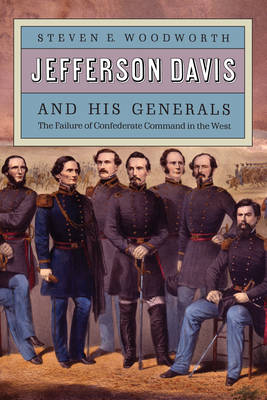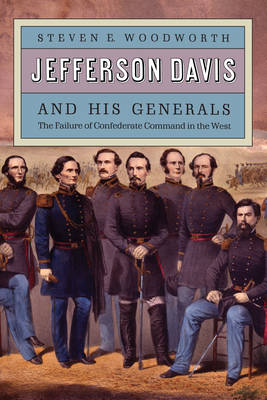
- Retrait gratuit dans votre magasin Club
- 7.000.000 titres dans notre catalogue
- Payer en toute sécurité
- Toujours un magasin près de chez vous
- Retrait gratuit dans votre magasin Club
- 7.000.0000 titres dans notre catalogue
- Payer en toute sécurité
- Toujours un magasin près de chez vous
Description
Winner: Fletcher Pratt Award
Jefferson Davis is a historical figure who provokes strong passions among scholars. Through the years historians have placed him at both ends of the spectrum: some have portrayed him as a hero, others have judged him incompetent.
In Jefferson Davis and His Generals, Steven Woodworth shows that both extremes are accurate--Davis was both heroic and incompetent. Yet neither viewpoint reveals the whole truth about this complicated figure. Woodworth's portrait of Davis reveals an experienced, talented, and courageous leader who, nevertheless, undermined the Confederacy's cause in the trans-Appalachian west, where the South lost the war.
At the war's outbreak, few Southerners seemed better qualified for the post of commander-in-chief. Davis had graduated from West Point, commanded a combat regiment in the Mexican War (which neither Lee nor Grant could boast), and performed admirably as U.S. Senator and Secretary of War. Despite his credentials, Woodworth argues, Davis proved too indecisive and inconsistent as commander-in-chief to lead his new nation to victory.
As Woodworth shows, however, Davis does not bear the sole responsibility for the South's defeat. A substantial part of that burden rests with Davis's western generals. Bragg, Beauregard, Van Dorn, Pemberton, Polk, Buckner, Hood, Forrest, Morgan, and the Johnstons (Albert and Joseph) were a proud, contentious, and uneven lot. Few could be classed with the likes of a Lee or a Jackson in the east. Woodworth assesses their relations with Davis, as well as their leadership on and off the battlefields at Donelson, Shiloh, Vicksburg, Murfreesboro, Chickamauga, and Atlanta, to demonstrate their complicity in the Confederacy's demise.
Extensive research in the marvelously rich holdings of the Jefferson Davis Association at Rice University enriches Woodworth's study. He provides superb analyses of western military operations, as well as some stranger-than-fiction tales: Van Dorn's shocking death, John Hood and Sally Preston's bizarre romance, Gideon Pillow's undignified antics, and Franklin Cheatham's drunken battlefield behavior. Most important, he has avoided the twin temptations to glorify or castigate Davis and thus restored balance to the evaluation of his leadership during the Civil War.
Spécifications
Parties prenantes
- Auteur(s) :
- Editeur:
Contenu
- Nombre de pages :
- 400
- Langue:
- Anglais
- Collection :
Caractéristiques
- EAN:
- 9780700605675
- Date de parution :
- 27-06-90
- Format:
- Livre broché
- Format numérique:
- Trade paperback (VS)
- Dimensions :
- 155 mm x 231 mm
- Poids :
- 539 g

Les avis
Nous publions uniquement les avis qui respectent les conditions requises. Consultez nos conditions pour les avis.






